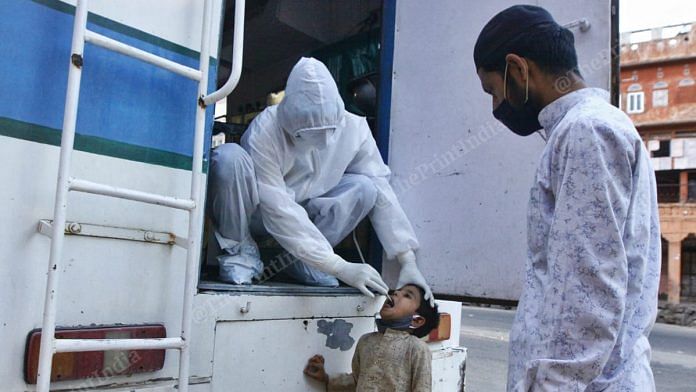New Delhi: India seems to be flattening the coronavirus curve. This curve traces the rate at which the number of infections double instead of noting an absolute increase in infections.
On 12 March, the number of Covid-19 cases in India was doubling every three days. After 12 March, India put restrictions on large gatherings and travel. Thus, the number of cases doubled every five days between 12 and 23 March. However, the situation worsened after the Tablighi Jamaat congregation and the cases began to increase. The rate of doubling of cases on 29 March was 4 days.
Now, the rate of doubling seems to be 6 days. This means the lockdown could be working. In fact, studies show that the number of cases would have been 478 per cent more if there was no lockdown.
Also read: Will know impact of 21-day lockdown this week or next, says top Modi govt expert
Coronavirus & demographics
The virus disproportionately harms older people. The virus is almost harmless to people below the age of 55 and only 12.5 per cent of India’s population is over 55 years. Only 2.5 people in a lakh need hospitalisation if they are between 18 and 49 years. Out of those between the ages of 20 to 54 years, only 1 per cent are likely to succumb to the infection.
Update on reproduction rate of Covid-19
New studies show a grim picture of Covid-19’s R-naught number or the reproduction rate of the virus. R-naught is the number of people a person can infect over the period of his or her infection.
Measles has one of the worst R-naught values of all pandemics. Its reproduction rate is approximately 20, which means that one person infected with measles can infect upto 20 people. Even today, around 70,000 people die of measles every year and this is despite a vaccine already existing.
On the other hand, Middle East respiratory syndrome (MERS) stopped spreading after its R-naught value fell below 1. Its R-naught value was 0.5 and it fell to 0.3. At these values, it can’t spread beyond a hospital.
New research based on Covid-19’s initial spread in China’s Wuhan indicates that its R-naught value could be 5.7 and not 2.2. This means around 80 per cent people can get infected with the disease. R-naught is reduced by social distancing & other mitigation and suppression measures.
A new strategy is appearing to deal with the problem of testing. With such large populations, it is difficult to test everyone. Andaman and Nicobar health authorities are exploring pool testing. Multiple samples can be pooled together to check if someone in the pool is positive of the disease. Uttar Pradesh government has said they have also got approval from ICMR to perform this.
Also read: Andaman & Nicobar has started conducting ‘pool tests’ for Covid-19 — first in the country
Lt Gen. Hanut Singh of the Indian Army
Lieutenant General Hanut Singh passed away on 13 April, five years ago in 2015. He led his famed regiment, Poona Horse, into one of the fiercest tank battles on the sub-continent in the 1971 war — the Battle of Basantar. When Pakistan’s 13 Lancers with Patton Tanks attacked the Indian position at Jarpal, they were surprised and destroyed by the Centurions of Poona Horse. His key decision to risk the regiment across an uncleared minefield proved to be the battle-winning factor. Lt. Gen. Hanut was awarded the Maha Vir Chakra while his lieutenant Arun Khetarpal was posthumously awarded a Param Vir Chakra.
Watch the latest episode of CTC here:



